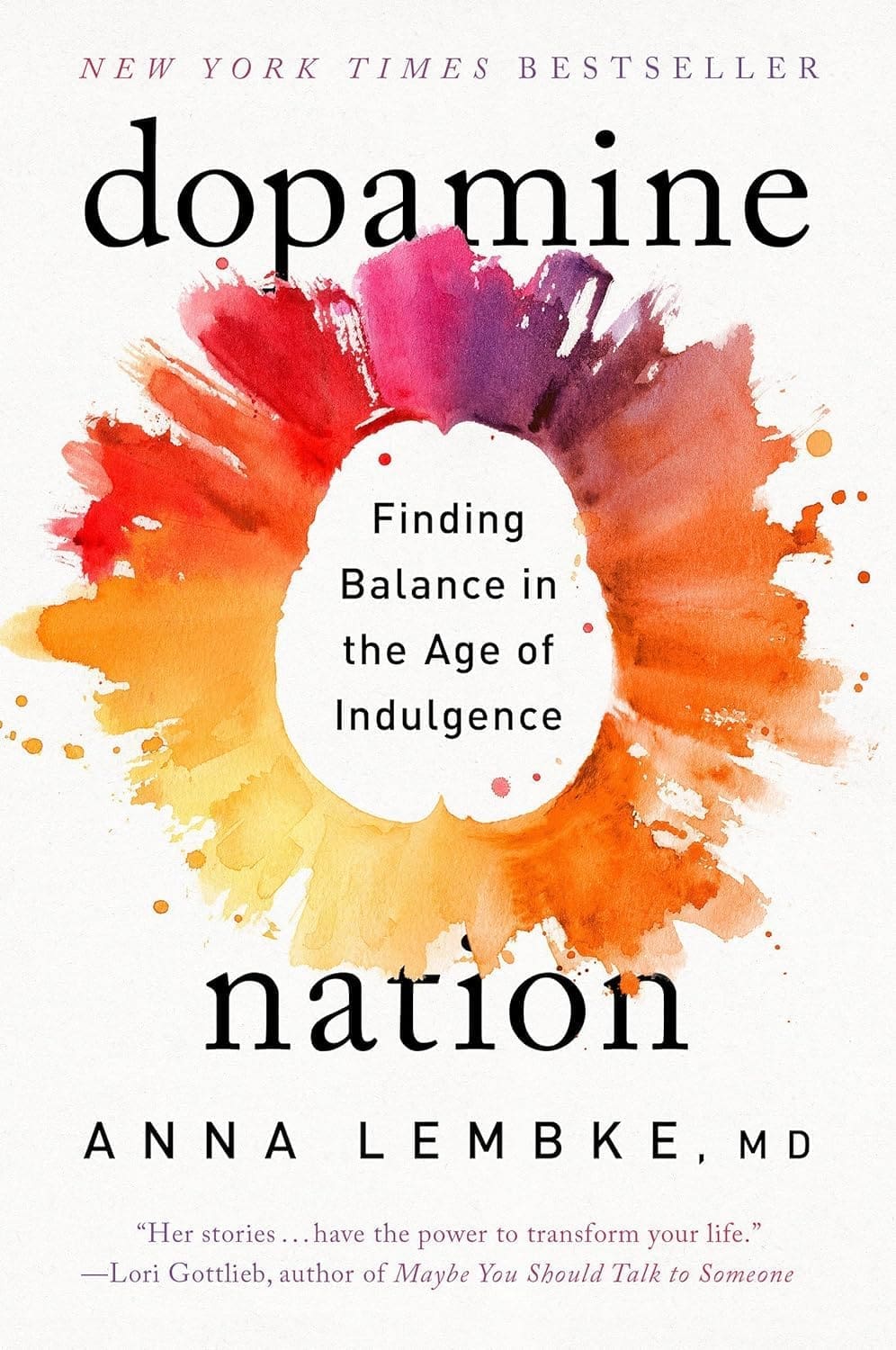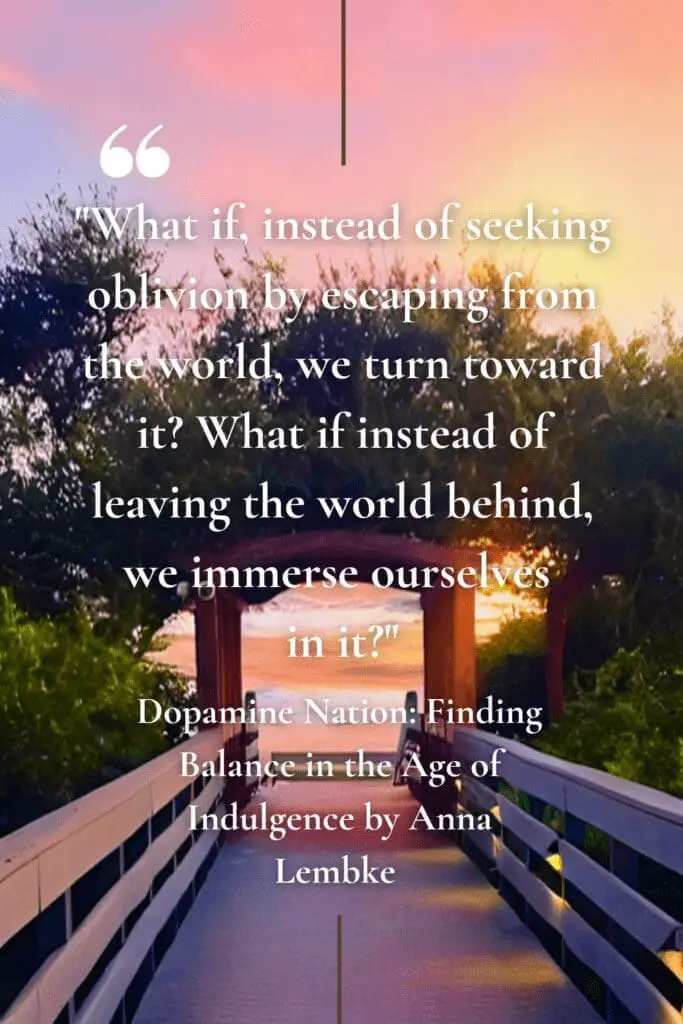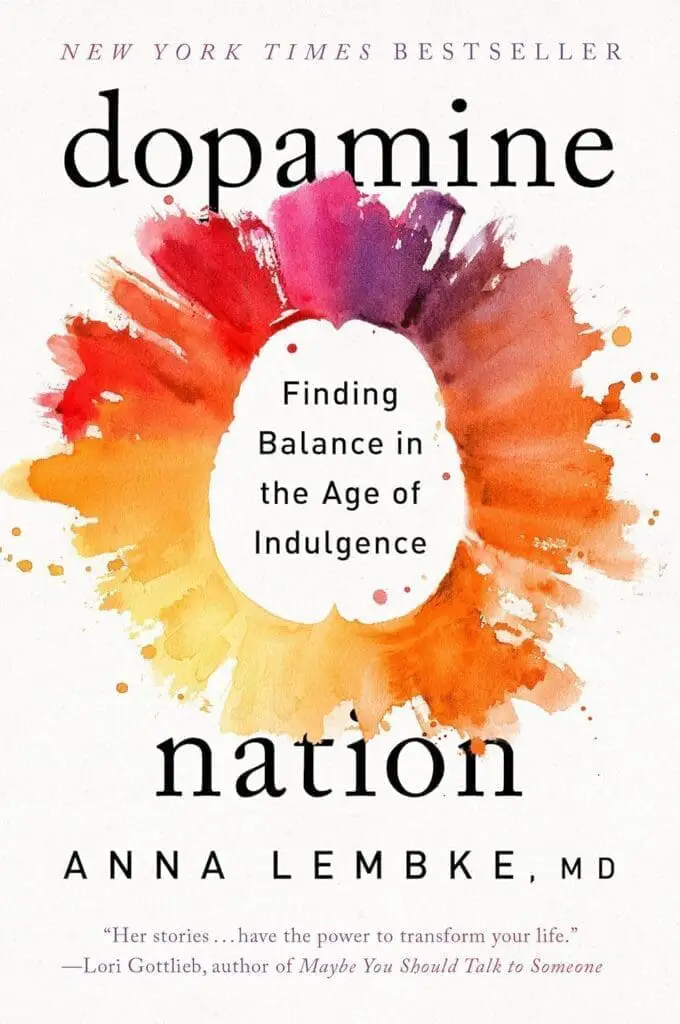Dopamine Nation
30 Quotes from Dopamine nation: Finding Balance in the Age of Indulgence by Anna Lembke

1. “That moment of wanting is the brain’s pleasure balance tipped to the side of pain.” pg. 2, Chapter 1: Introduction: The Problem, Dopamine Nation
2. “But I worry that we have both oversanitized and overpathologized childhood, raising our children in the equivalent of a padded cell, with no way to injure themselves but also no means to ready themselves for the world.” pg. 37, Chapter 2: Running from Pain, Dopamine Nation
3. “I’ve seen a similar paradox in many of my patients over the years: They use drugs, prescribed or otherwise, to compensate for a basic lack of self-care, then attribute the costs to a mental illness, thus necessitating the need for more drugs. Hence poisons become vitamins.” pg. 43, Chapter 2: Running from Pain, Dopamine Nation
4. “We’re all running from pain. Some of us take pills. Some of us couch surf while binge-watching Netflix. Some of us read romance novels. We’ll do almost anything to distract ourselves from ourselves. Yet all this trying to insulate ourselves from pain seems only to have made our pain worse.” pg. 44, Chapter 2: Running from Pain, Dopamine Nation
5. “The reason we’re all so miserable may be because we’re working so hard to avoid being miserable.” pg. 46, Chapter 2: Running from Pain, Dopamine Nation
6. “Dopamine may play a bigger role in the motivation to get a reward than the pleasure of the reward itself. Wanting more than liking.” pg. 48, Chapter 3: The Pleasure-Pain Balance, Dopamine Nation
7. “The paradox is that hedonism, the pursuit of pleasure for its own sake, leads to anhedonia, which is the inability to enjoy pleasure of any kind.” pg. 57, Chapter 3: The Pleasure-Pain Balance, Dopamine Nation
8. “A pleasure-pain balance tilted to the side of pain is what drives people to relapse even after sustained periods of abstinence. When our balance is tilted to the pain side, we crave our drug just to feel normal (a level balance).” pg. 57, Chapter 3: The Pleasure-Pain Balance, Dopamine Nation
9. “Here’s the good news. If we wait long enough, our brains (usually) readapt to the absence of the drug and we reestablish our baseline homeostasis: a level balance. Once our balance is level, we are again able to take pleasure in everyday, simple rewards. Going for a walk. Watching the sun rise. Enjoying a meal with friends.” pg. 57, Chapter 3: The Pleasure-Pain Balance, Dopamine Nation
10. “We’ve all experienced the letdown of unmet expectations. An expected reward that fails to materialize is worse than a reward that was never anticipated in the first place.” pg. 61, Chapter 3: The Pleasure-Pain Balance
11. “My patients with gambling addiction have told me that while playing, a part of them wants to lose. The more they lose, the stronger the urge to continue gambling, and the stronger the rush when they win—a phenomenon described as “loss chasing.” I suspect something similar is going on with social media apps, where the response of others is so capricious and unpredictable that the uncertainty of getting a “like” or some equivalent is as reinforcing as the “like” itself.” pg. 62, Chapter 3: The Pleasure-Pain Balance
12. “Science teaches us that every pleasure exacts a price, and the pain that follows is longer lasting and more intense than the pleasure that gave rise to it. With prolonged and repeated exposure to pleasurable stimuli, our capacity to tolerate pain decreases, and our threshold for experiencing pleasure increases.” pg. 66, Chapter 3: The Pleasure-Pain Balance
13. “By raising our neural set point with repeated pleasures, we become endless strivers, never satisfied with what we have, always looking for more. But herein lies the problem. Human beings, the ultimate seekers, have responded too well to the challenge of pursuing pleasure and avoiding pain. As a result, we’ve transformed the world from a place of scarcity to a place of overwhelming abundance.” pg. 67, Chapter 3: The Pleasure-Pain Balance
14. “Abstinence is necessary to restore homeostasis, and with it our ability to get pleasure from less potent rewards, as well as see the true cause and effect between our substance use and the way we’re feeling.” pg. 77, Chapter 4: Dopamine Fasting
15. “Mindfulness is simply the ability to observe what our brain is doing while it’s doing it, without judgment.” pg. 82, Chapter 4: Dopamine Fasting
16. “If we wait until we feel the compulsion to use, the reflexive pull of seeking pleasure and/ or avoiding pain is nearly impossible to resist. In the throes of desire, there’s no deciding…But by creating tangible barriers between ourselves and our drug of choice, we press the pause button between desire and action.” pg. 92, Chapter 5: Space, Time, and Meaning
17. “…addicts are bored or frustrated problem-solvers who instinctively contrive Houdini-like situations from which to disentangle themselves when no other challenge happens to present itself. The drug becomes the reward when they succeed and the consolation prize when they fail.” pg. 107, Chapter 5: Space, Time, and Meaning
18. “With intermittent exposure to pain, our natural hedonic set point gets weighted to the side of pleasure, such that we become less vulnerable to pain and more able to feel pleasure over time.” pg. 144, Chapter 7: Pressing on the Pain Side
19. “Exercise has a more profound and sustained positive effect on mood, anxiety, cognition, energy, and sleep than any pill I can prescribe.” pg. 152, Chapter 7: Pressing on the Pain Side
20. “We have to remember that we will feel pleasure after pain, and we’re remarkably amnestic about this sort of thing. I know I have to relearn the lessons of pain every morning as I force myself to get out of bed and go exercise.” pg. 152, Chapter 7: Pressing on the Pain Side
21. “Radical honesty—telling the truth about things large and small, especially when doing so exposes our foibles and entails consequences—is essential not just to recovery from addiction but for all of us trying to live a more balanced life in our reward-saturated ecosystem. It works on many levels.” pg. 176, Chapter 8: Radical Honesty
22. “The antidote to the false self is the authentic self. Radical honesty is a way to get there. It tethers us to our existence and makes us feel real in the world. It also lessens the cognitive load required to maintain all those lies, freeing up mental energy to live more spontaneously in the moment.” pg. 192, Chapter 8: Radical Honesty
23. “When the people around us are reliable and tell us the truth, including keeping promises they’ve made to us, we feel more confident about the world and our own future in it. We feel we can rely not just on them but also on the world to be an orderly, predictable, safe kind of a place. Even in the midst of scarcity, we feel confident that things will turn out okay. This is a plenty mindset.” pg. 195, Chapter 8: Radical Honesty
24. “Finding connectedness and meaning requires radical honesty.” pg. 197, Chapter 8: Radical Honesty
25. “To truly understand someone is to care for them.” pg. 210, Chapter 9: Prosocial Shame
26. “When we’re accountable to ourselves, we’re able to hold others accountable. We can leverage shame without shaming. The key here is accountability with compassion.” pg. 219, Chapter 9: Prosocial Shame
27. “Social media propels our tendency toward self-shame by inviting so much invidious distinction. We’re now comparing ourselves not just to our classmates, neighbors, and coworkers, but to the whole world, making it all too easy to convince ourselves that we should have done more, or gotten more, or just lived differently.” pg. 229, Chapter 9: Prosocial Shame
28. “Addictive drugs and behaviors provide that respite but add to our problems in the long run.” pg. 231, Conclusion: Lessons of the Balance

29. “What if, instead of seeking oblivion by escaping from the world, we turn toward it? What if instead of leaving the world behind, we immerse ourselves in it?” pg. 231, Conclusion: Lessons of the Balance
30. “I urge you to find a way to immerse yourself fully in the life that you’ve been given. To stop running from whatever you’re trying to escape, and instead to stop, and turn, and face whatever it is.” pg. 233, Conclusion: Lessons of the Balance
Related Posts:

